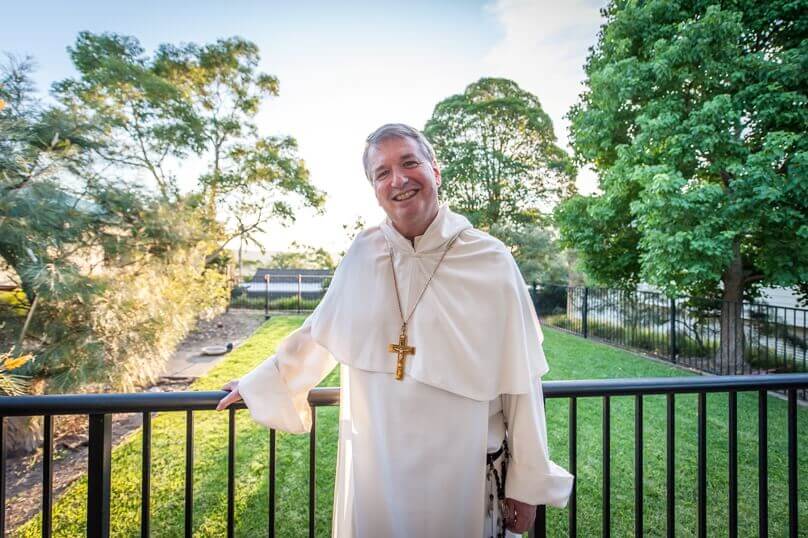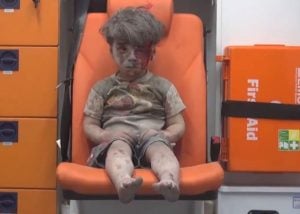
The picture of Abdul Hamid Youssef, cradling his dead twins, Ahmed and Aiya, broke the heart of our world last week. Abdul lost 22 relatives, including his wife Dalal al-Saha and two nine-month-old children, during a chemical weapon attack by the Syrian government on its own people. The image will stick in our memories alongside that of five-year-old Omran Daqneesh, the boy sitting dazed in an ambulance after being pulled from the rubble in Aleppo last August, and even more harrowing that of Alan Kurdî, the three-year-old refugee drowned in the Mediterranean in September 2015.

These pictures make real for us the talk of seismic shifts in the politics of the nations, fears for the world economy and ecology, a tense security situation. This past week we’ve been reminded that Christians are often the targets, as we saw images of blackened and bloodied sanctuaries of two Coptic Christian churches in Egypt bombed on Palm Sunday. My own grandmother was born in the then-peaceful city of Alexandria, after her family fled persecution elsewhere: now its Cathedral of St Mark has been wickedly desecrated and dozens killed or maimed.
Add Brexit, new presidents in America and the Philippines, impeached presidents in Brazil and South Korea, an attempted coup in Turkey, catastrophic food shortages endangering millions in the horn of Africa, mass exodus from Syria and Iraq, terrorist attacks not just in the Middle East but in Nice, Berlin, Westminster and Stockholm… a lot has happened since last Easter!
Closer to home, leaders come and go, the Royal Commission is winding down after many shameful revelations, storms and floods have battered many, and the transpacific partnership is over. Many experience financial or emotional insecurity, feel underappreciated or exploited, or are eaten up by grudges, envy or addictions. As J.M.C. Crum sang in his Easter carol:
In the grave they laid him, love whom men had slain,
Thinking that never he would wake again.
Laid in the earth like grain that sleeps unseen…[1]
We sometimes feel like the first disciples on Good Friday: disenchanted or demoralised, our hopes and dreams laid in the earth. Our faith in our leaders, our companions, even ourselves, can be sorely tested. We look into the tomb of our lives and see nothing but emptiness, look into our hearts and find nothing but longing.
But Easter says: look again! Even from the Cross Jesus hoped against hope. He anticipated our hope to survive our trials and transcend even the grave – whether we are amidst the horrors of Syria or the more mundane ‘terrors of the night’ in Sydney. In His words and deeds, His passion and death, Jesus is revealed as God’s irrevocable commitment to humanity.
Look again therefore: like fence posts in the Australian countryside that sometimes sprout to life, so the wood of the Cross, that seemed so dead, has new shoots on it! As He entered into His Passion Jesus declared: “Now the hour has come for the Son of Man to be glorified. Truly I say to you: unless a grain of wheat falls into the ground and dies, it remains a single grain; but if it dies it bears much fruit.” (Jn 12:23-4; cf. 1Cor 15:37-8)
Now the green blade riseth from the buried grain,
Wheat that in dark earth many days has lain;
Love lives again, that with the dead has been:
Love is come again, like wheat that springeth green.
As many of you know, only a year ago I was suffering a crippling, even life-threatening, condition called Guillain-Barré Syndrome. I found myself with Jesus, God nailed to a cross, helpless, humiliated and suffering. I cried out with Him to our Father-God.
By the grace of God and the prayers of many, through the wonderful care of professionals and support of those near to me, my nerves and muscles gradually recovered. I learnt again how to walk, write, use cutlery, hold the chalice… The stairs of this sanctuary seemed then like climbing Everest. But I experienced my own little rising from the dead. Dare we hope for the same for our soon-to-be-baptised Sebastian and all the Baptised? Is resurrection possible for our broken world and our broken hearts? Might dazed Omran, grieving Abdul and deceased Alan yet be restored to joy?
Forth He came at Easter, like the risen grain,
He that for three days in the grave had lain.
Quick from the dead my risen Lord is seen:
Love is come again, like wheat that springeth green.
However sorely tested we may sometimes be, Easter speaks to each one of us of hope. Hope for a world of more than blind natural forces and blinding human wilfulness. Hope for a place of no more hurt from hate or indifference. Hope for a civilisation of life and love, of fidelity and healing.
Easter says to us: look again into the tombs of your hurts and fears, the coffins of your guilt and grudges, the mausoleums of violence and vice. Look beyond the emptiness to experience freedom, freshness, fulfilment.
Christ is alive and ready to raise us up (Acts 10:34-43; Jn 20:1-9; Mt 28:1-10). Like a vulnerable chick in an Easter egg, we are waiting to break out of our shell to achieve so much unrealised potential. Like the grain of wheat, apparently dormant in the ground, we are ready to sprout with new energy. Like the tree of the cross, we must become a tree of life.
When our hearts are wintry, grieving, or in pain,
Thy touch can call us back to life again;
Fields of our hearts that dead and bare have been:
Love is come again, like wheat that springeth green.
Links added.
References
[1] John MacLeod Campbell Crum, Now the Green Blade Riseth in the Oxford Book of Carols (1928); set to the 15th-century French melody Noël Nouvelet.
